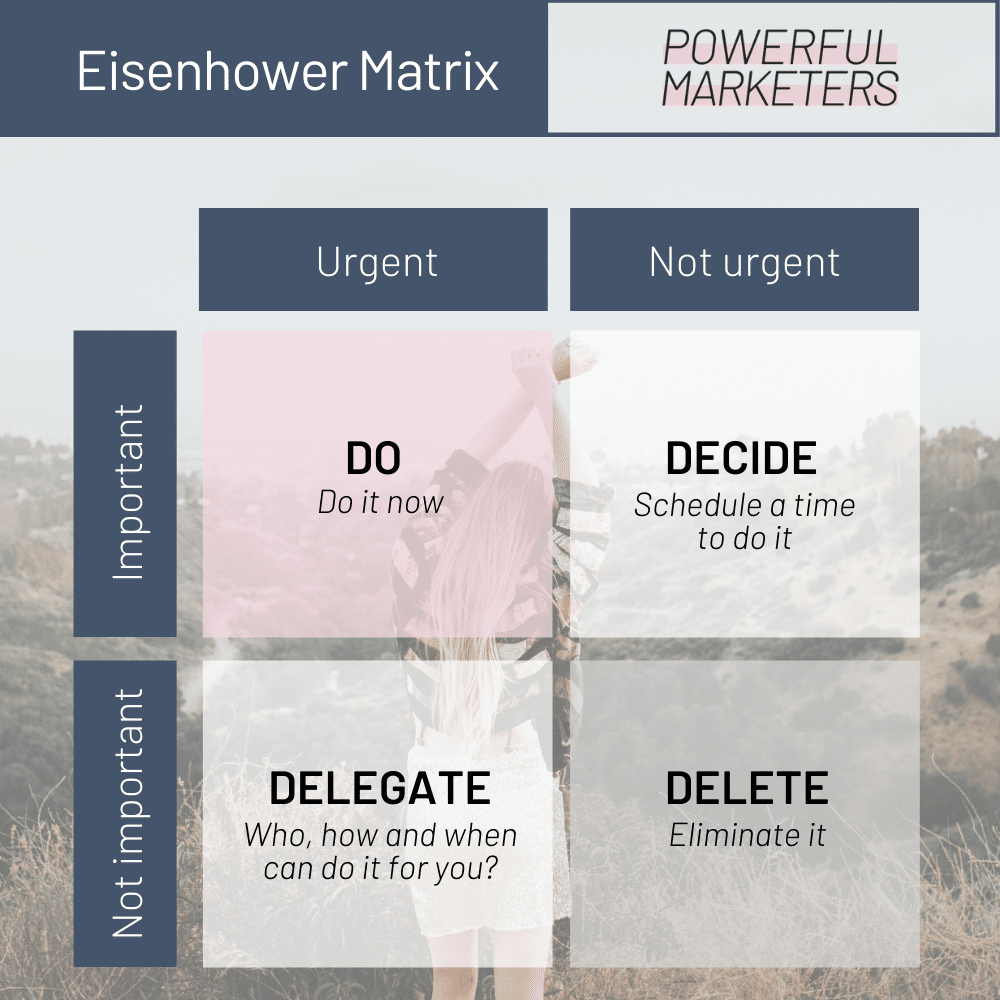If you were a client of a bank that each morning gives you 86 400 €, and you could do whatever you wanted with that money, but you couldn’t transfer what’s left of it in the evening, then how would you spend it? Bear in mind that if you fail to use the day’s deposits, the loss is yours and there is no going back. Well, most people would say that they’d cash out all the money every day, of course. But in reality, most of us allow the majority of it to go to waste. Because everyone has such a bank and its name is time.
Every day, it credits you with 86,400 seconds. How much of it are you willing to lose? We don’t often think about the value of time and we allow the daily disruptions to steal our attention from what matters the most to us. This is why on our latest Powerful Marketer Talks we discussed the importance of time management. Watch the full recording of the webinar at the end of the post!

Start by implementing the Golden Nugget
If you want to get better organized with your time, you need to create a strong foundation for a balanced life. The Golden Nugget or 8-8-8 indicates how everybody should spend their 24 hours ideally:
- 8 hours for your work or obligations. It is also okay if sometimes it takes longer, as long as you rest more later and you won´t abuse yourself with overworked hours.
- 8 hours for resting and sleeping – the norm is around 7-9 hours, but people are different, so somebody needs 6 hours and somebody needs 10 hours. However, if you sleep less than 6 hours on a regular basis (for 2 weeks or longer), then your energy will begin to drain. Less than 6 hours or more than 10 hours are both bad and you need to think about the effect it has on your life. You will get tired faster and you allow yourself to be influenced by everything around you so much more! Sleep is very important!
- 8 hours for recreation gives you the opportunity to feel good and make sense of life. This includes taking care of your hygiene, nutrition, logistics, hobbies, family, etc. It also involves everything for which you say “I like / I want / I can” (such as going to the theater, cinema, watching TV, hanging out with friends, etc.), so all the pleasures in your life.

There are a few important things to remember about the 8-8-8 rule:
- 24-42 year-olds can take a “loan” out of the 8 hours of sleep and/or recreation, as they are building their careers and lives and therefore need to spend more time on their obligations. But if younger or older people do it, they will pay for this “loan” with their health and sooner or later there will be issues.
- The activities you choose to do in your ‘recreation’ time slot cannot be disturbing to the loved ones (for example, 8 hours is not meant for drinking beer every night at a bar etc.) So, the things that make you happy shouldn’t negatively affect your family.
- If you are going through a very emotional phase (such as going through trauma, ie. mourning a loved one or divorcing, etc.) then you should take at least 1 day per week off to deal with these issues. For example, instead of 5 working days, ask for a 4-day working week for six months. And then look how it helps with your anxiety. Your psycho-hygiene needs to be as good as your dental care and that’s really the most important thing you need to understand here.
Prioritize your tasks
Time management and task management are always connected. If you have a limited amount of time for your home obligations and work obligations, then you really need to start thinking smarter. What are the most critical tasks that need to be done first? What are the biggest goals of your personal and professional life? What consistent activities get you closer to that goal? Because, you need to make sure that in your limited timeframe, you get those crucial tasks done, ALWAYS.
A great way to analyze and prioritize your tasks is to use the Eisenhower Matrix. It helps you to categorize all of your tasks in your to-do list into four categories, based on their importance and time-sensitivity:
- Essential – something that must be done today, it’s very important and very time-sensitive. You need to start with those tasks NOW.
- Necessary – something that must be done today or tomorrow.
- Unnecessary – it’s not that important, but it is rather time-sensitive. And you should delegate it to others, if possible.
- Information coffin – something that you’ve postponed for weeks and consequently no longer really need it and can delete it, or add a reminder in 2-3 months to evaluate this task again.

Remember that not everything that ‘screams’ at you, is a priority. Brian Tracy, a motivational public speaker and self-development author, said that there are usually 3 activities that count for 90% of your goals and income. So, ask yourself, if you could only do one thing all day long, what would it be for your company or for yourself? What is the second most important thing? The third most important thing? The answers are already inside of you! You just need to force yourself to overcome procrastination, and really take responsibility for your choices and your time!
Schedule tasks into your calendar
Another important thing to remember about time management is that if you ‘force’ yourself to get the necessary things done in the time slot you have assigned for different tasks, then your effectiveness will go up, as there is no room for procrastination! Always plan your week or month ahead. For example, do it last thing on Friday evening, or plan a time slot for it on Sunday. What’s important is that you’ll do it before the new week or month begins. And the process looks like this:
- Put the most important tasks into your calendar
- Include your MIP (most-important-person = ME) time and planning time. The first one is for you and for strategic thinking, the other one is for tactical planning of campaigns or other projects.
- Schedule secondary tasks after you’ve scheduled the main to-do items
- Then, add all the tasks you need to delegate, follow-up times with colleagues, employees, partners, and accountability partners.
- Don’t forget to add breaks (for lunch, etc) and time for commuting and transportation
If you don’t know how much time you should allocate to each task, then start by observing yourself. Use time-tracking apps, such as Toggl.com to really acknowledge where your time goes. Eventually, you can create goals for yourself to shorten the time it takes for you to complete a specific task.

Having focus and a clear understanding of what needs to be done and when brings our anxiety down a lot, and this will allow you to achieve more and do more meaningful things with your time. You deserve a life filled with activities that bring you joy and happiness!
#timemanagement #prioritize #effectiveness #productivity #time #value #calendar #organized #priorities #eisenhower #goldennugget